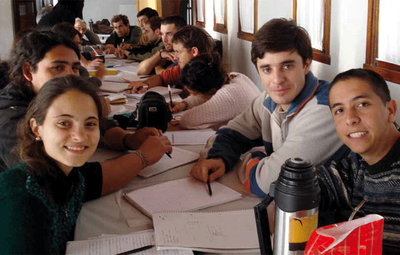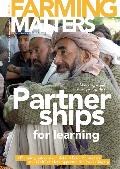A group of university researchers has been working on an agricultural education model designed to meet the many challenges facing Argentinean agriculture. Rather than just adding “green content” to the existing curriculum, working with the teachers in rural schools in the province of Buenos Aires is showing very promising results.

Meeting these aims requires professionals who are trained for this purpose. But for several decades, Argentina’s agricultural education model has focused on approaches that increase reliance on external inputs, and has ignored the social and environmental costs of this.
As a result, the profile of those currently finishing their studies seems largely inadequate While environmental issues are being considered in many universities, there is much less emphasis on them in technical institutes or in secondary schools. Agricultural schools in Argentina play a twofold role: they serve as secondary education institutions and prepare students for later life, often working in agriculture. The Province of Buenos Aires has more than 50 agricultural schools, with approximately 17,000 students. As only a small percentage of them go on to university, their agricultural understanding (and future activities) are shaped by the perspective and focus presented in school.
A new approach
What’s going on in Brazil?
A recent survey carried out in Brazil found out that, throughout the country, there are 110 courses on agroecology available at different levels – including several which are part of MSc or PhD programmes. This seems to be good news, as it is probably a world record. But ABA-Agroecologia (the Brazilian Agroecology Association) is also somewhat concerned. The main reason is the fear that the teachers running these courses may be following the same pedagogical and methodological approaches that are prevalent in other formal education and extension departments. ABA-Agroecologia has started asking several questions. How do these teachers prepare themselves? Do these new courses follow a systemic and holistic perspective? Is sufficient attention given to the relationship between different disciplines? Do they pay attention to local knowledge, or to local innovation processes?
In an attempt to answer these questions, we have started a process that aims to describe and analyse all these courses and programmes. The intention is not to control, or compare courses, but rather to generate a nation-wide debate which can help us define the best way to support universities, schools and institutions, and improve our work. Our idea is to follow the same model which brought together many different experiences during 2009, which culminated with the VIIth Agroecology Congress held in November in Curitiba. This process involved a series of meetings that took place in different regions, and a detailed documentation and analysis of each experience. With financial support from the federal government, we are sure that this process will be successful.
Ma. Virginia de Almeida Aguiar, Department of Education and Rural Extension, Universidade Federal Rural de Pernambuco. E-mail: mvirginia@gmail.com
Several researchers at the Universidad Nacional de La Plata came to the conclusion that a new and comprehensive approach to agricultural education is needed, focusing on a new way of thinking and of understanding reality. This approach needs to go beyond incorporating “green content” in the school’s curriculum. Rather, courses should follow a comprehensive vision that includes biological, physical, chemical, ecological and social aspects, including an economic, political and cultural perspective.
We realised that this could only come by working together with all those involved – in particular with those in charge of the classes in these schools. So the Faculty of Agricultural Sciences and Forestry of our university decided to design and implement a course to train teachers for this role.
Since 1998, this course has focused on analysing the problems resulting from the predominance of conventional agriculture practices; providing alternatives on the basis of a holistic and systemic perspective; and providing methodological tools for diagnosing, assessing and monitoring farms and ecosystems.
We are especially interested in building an innovative pedagogical approach, involving teachers – and, via them, students – in the process of understanding rural issues and finding solutions to them.
Modular courses
This course is structured so that teachers in rural areas are able to attend. Run once every year, each course lasts for approximately 4 months, and normally has between 20 and 35 school teachers as students. Continuous presence is not required: the course involves a one-day session every month, in one of the schools where the students work.
All participants receive the documents in advance so they can come prepared, and discuss the ideas during the session. Each literature pack includes a guide and a questionnaire that students must complete and hand in. The sessions are used to discuss the ideas and theories, to clarify doubts or to respond to specific questions. Participants are encouraged to compare the theories with their own experiences.
The main objective of every session is to provide a forum for discussion. To this end, students are divided into groups, trying to integrate different backgrounds and experiences.
When possible, field trips are made to allow students to look at and assess local production systems, their scope and limitations, and then prepare a report which is used in the group discussions. The modules encourage the active participation of all students. At the end, all of them must submit a proposal, showing how they plan to introduce an agroecological focus in their own school.
Main achievements
Field visits complement the reading material and enrich the learning process.Having worked with 150 school teachers since we started offering this course, we are very pleased to see a high degree of motivation and a lot of interest in following this course. The structure of the course has proved to be flexible and adaptable to the needs of those participating in it – all of whom continue working as teachers. As one of them said, “We do not have to go to university, but rather the university comes to us.” This structure has made it easier for them complete the course.
The course provides students good reading material and relevant information that is written in Spanish, and which all relates to Argentinean rural areas. And, in addition to the literature, all participants value the opportunity of going out into the field with the whole group (or hosting the group in their own schools) to look at and discuss real concrete problems. This makes it much easier to understand the concepts within agroecology.
Quoting another student, “This course has given us the tools to understand the problems we were seeing in our area and to see the logic of an agroecological alternative.” Overall, the results of our work with school teachers have been positive. In some cases, such as in the schools in Bavio and Abasto, we have seen teachers adding practical activities to their day-to-day programmes.
In others (e.g. Tres Arroyos) a group of teachers succeeded in changing the entire curriculum and the mode of education in their school, taking the agro-ecosystem rather than the farm as the point of departure. And we have also seen changes in the communities where the schools are located. A very clear change has been seen in terms of the “demand” for information on agroecology and sustainable agriculture. Three schools asked us to repeat the course the following year.
Highly rewarding
But while the achievements have been encouraging, this approach to training teachers, and of mainstreaming agroecology among secondary schools, still faces difficulties. One of the main drawbacks is the preference that students have for “content”, disregarding other skills or attitudes (such as critical thinking or analytical skills), which are just as important. Another difficulty is the lack of experienced lecturers for this kind of courses, or a lack of good examples at the local level.
One of the aspects that have hindered implementation of these ideas in school curricula is the general idea that agroecology is limited to growing crops without chemical inputs, and that it is a recipe which can only be followed in very small areas. This can be a serious drawback in, say, the Argentinean pampas. Despite such limitations and difficulties, developing and teaching it has been a highly rewarding, enriching and motivating experience. We have been able to narrow the distance between the university and the rural areas and, in this way, contribute to the development and dissemination of concepts and ideas about sustainable agriculture.
Text: Santiago J. Sarandon and Claudia C. Flores
Santiago J. Sarandon and Claudia C. Flores work at the Faculty of Agricultural and Forestry Sciences, Universidad Nacional de La Plata, Buenos Aires, Argentina.
E-mail: sarandon@agro.unlp.edu.ar ; cflores@agro.unlp.edu.ar

